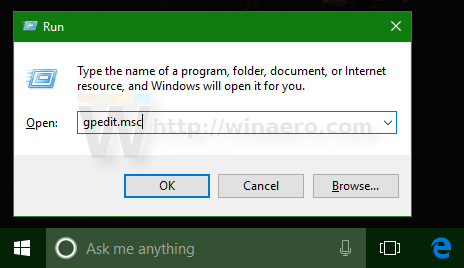As you may already know, notification area, also known as system tray, is a special area on the taskbar where you can see tiny icons of the network status indicator, the volume icon, the action center icon and icons of some apps which run in the background. In this article, we will see how to hide it.
Advertisеment
Windows 10 already hides the notification area when Tablet mode is enabled. When in Tablet mode, Windows 10 becomes suitable more for use with a portable tablet or a detachable 2-in-1 PC. With no mouse and physical keyboard, the touch UI takes centerstage and Universal apps, virtual touch keyboard and the virtual touchpad are more active. Notification area icons are hidden, and the taskbar does not show running app icons.

If you want to hide the notification area when Tablet mode is disabled, you will see that there is no such option in the GUI. Hiding the system tray in the regular Desktop mode is a kind of restriction, so it should be done with either a Registry tweak or Group Policy. Let's review both methods.
To hide the notification area in Windows 10, do the following.
- Open Registry Editor.
- Go to the following Registry key:
HKEY_CURRENT_USER\Software\Microsoft\Windows\CurrentVersion\Policies\Explorer
Tip: See how to jump to the desired Registry key with one click. If you do not have such a key, then just create it.
- Here, create a new 32-bit DWORD value NoTrayItemsDisplay. Note: Even if you are running 64-bit Windows, you still need to use a 32-bit DWORD as the value type.
Set it to 1 to hide the notification area (system tray) from the taskbar.
- To make the changes done by the Registry tweak take effect, you need to sign out and sign in again to your user account. Alternatively, you can restart the Explorer shell.
To undo the tweak, delete the NoTrayItemsDisplay value.
Using the method described above, you will be able to hide the system tray for the current user.
If you are running Windows 10 Pro, Enterprise, or Education edition, you can use the Local Group Policy Editor app to hide the system tray area with a GUI.
Hide the notification area with Local Group Policy Editor
- Press Win + R keys together on your keyboard and type:
gpedit.msc
- Group Policy Editor will open. Go to User Configuration\Administrative Templates\Start Menu and Taskbar. Enable the policy option Hide the notification area as shown below.

That's it.
Support us
Winaero greatly relies on your support. You can help the site keep bringing you interesting and useful content and software by using these options:


what is your primary computer specs?
I’d like to be able to put 1 or 2 icons on the Taskbar then hide the ‘Tray’!
Maybe this will be added to Winaero Tweaker.